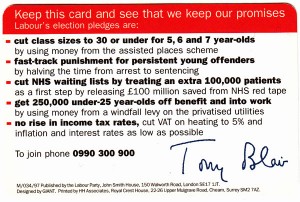We’ve heard a lot from Nick Clegg and the people round him that we need to be a ‘party of government’. Almost all Lib Dems agree with that – although many disagree strongly that this also means that we should stop being ‘a party of change’ and turn into a ‘party of the status quo’ – as our recent European campaign seemed to suggest.
But let’s focus on what we all agree on – and focus on the importance of being a ‘serious party of government’. Here are a few thoughts on what other ‘serious parties of government’ do differently to the Lib Dems and what that might mean for how the direction of the party needs to change.
Here goes:
‘Serious parties of government’ make pledges and, generally, try to keep them
One of the stranger consequences of the tuition fees catastrophe is that the leadership and leadership loyalists have decided that the Liberal Democrats shouldn’t make pledges any more.
The other ‘serious parties of government’ don’t agree with them.
While Labour don’t always appear to be serious about government now, they certainly were under Tony Blair in 1997. Remember this?
 It’s a pledge card. It even has the word ‘pledge’ written on it. And Labour were pretty serious about keeping to them.
It’s a pledge card. It even has the word ‘pledge’ written on it. And Labour were pretty serious about keeping to them.
What about the 2010 pledge from David Cameron on government support for pensioners?
He’s kept it – even though it’s far more expensive than, say, the tuition fees pledge. And he’s just made another couple with a 2017 referendum on Europe as a ‘cast iron pledge‘ and another pledge to pensioners to increase the pension by 2.5% a year till 2020.
And this is hardly surprising. People want to know what ‘serious parties of government’ want to do in the future. This is particularly important in a coalition when there’s a real danger of giving the impression that what the government is doing is all you’re about.
That’s why the Conservatives are smart to be making pledges. And why it’s wrong for the Lib Dems to have decided they’re always a bad idea.
When in coalition, ‘serious parties of government’ make clear what they’re being stopped from doing
The Conservatives and Liberal Democrats have taken almost diametrically opposed approaches to communicating their achievements in coalition.
Nick and his central team of advisors have gone with a “what we’ve got and what we’ve stopped” strategy – outlining Lib Dem achievements in Government – and what we’ve stopped the Conservatives from doing.
David Cameron and the Conservatives have gone with a “what we’ve got and what we’ve been stopped from doing” strategy and haven’t put any effort into telling voters what they’ve stopped the Liberal Democrats from doing.
David Cameron’s strategy is working better.
Ultimately this is hardly surprising. While not repudiating the achievements of the coalition, the Conservative strategy makes it clear that they want to be doing something more and different to what the coalition government alone is able to achieve.
The Liberal Democrat strategy does the opposite. It reinforces the Conservative message (always a bad sign) – and does nothing to give any steer on what the Liberal Democrats would be doing or trying to do if governing alone or negotiating a new coalition.
Focusing on what you’ve stopped the Conservatives doing also reminds people of what you’ve not stopped the Conservatives doing – which, unavoidably in a coalition, is going to include a bunch of things your supporters are unhappy about.
In essence, it leaves the Liberal Democrats defending the coalition as the best of all possible worlds, rather than making clear – as we should always be doing – how we want things to be better than they are today.
Not smart. Not something that ‘serious parties of government’ do. And something that needs to change.
The most successful ‘serious parties of government’ challenge the status quo
Political theorists like to contrast establishment parties and challenger parties, but real life experience suggests that the most successful politicians and ‘serious parties of government’ are able to ride both horses.
Keith House has laid out the case for being a ‘party of government and a party of protest’ on Lib Dem Voice – and I had a go on the BBC on the issue of not being a ‘party of complacency and the status quo‘.
Even more simply, Nick Clegg was the insurgent in the 2010 Prime Ministerial debates and won (at least the first one). He was the representative of the establishment in the 2014 EU debates and lost. Of course, that’s not the whole story. But a large chunk of the British electorate – left, right and centre – are looking for change from where we are today – and only one person in the 2014 debate was seen to be offering it.
Two of the most striking examples lie outside the Liberal Democrats.
It’s no coincidence that Britain’s most electorally successful Prime Ministers – Margaret Thatcher and Tony Blair – started out being seen as outsiders challenging the status quo and having an agenda for change – and stayed that way more or less until the end.
Margaret Thatcher – to put it mildly -Â never gave any sense of satisfaction with the status quo or with the establishment until the day she died.
In both cases this could put them in conflict with members of their own party, but this was generally because they were seen as wanting to change things too much or too quickly – and not because they appeared to be taking things too slowly.
And it wasn’t just something that happened to get them elected first time. It was something they kept doing all the way through their terms of office.
Is that all there is to it?
Unfortunately not. There’s the small matter of delivering distinctive policy in government (and not just what was agreed back in 2010 in the coalition agreement) – and having the right set of policies that take you beyond the status quo.
It’s possible for a policy to be radical, promised in your manifesto and wildly unpopular – as Margaret Thatcher discovered with the poll tax.
But a complacent defence of the current situation and treating the coalition government as the best of all possible worlds is no longer an option. If the leadership of our party could learn from other ‘parties of government’, start telling us what they want to do if they weren’t held back by the Conservatives – what we’d be delivering if we had more MPs and a stronger position in Government - and get the party back to challenging the status quo, it would be a huge step in the right direction.


 It’s a pledge card. It even has the word ‘pledge’ written on it. And Labour were
It’s a pledge card. It even has the word ‘pledge’ written on it. And Labour were 

